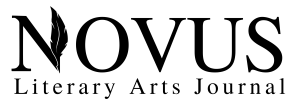Poetry
The Old Farmhouse
There’s an old farmhouse that creeks
Its big rooms hard to heat in the wintertime
With a chimney from 1802
On the edge of a neglected orchard
My grandpa planted and tended to
On the edge of a two -lane highway
That was a horse trail
And then a dirt road
And now an interstate
With mountain views
And a big front porch
And a kitchen with butternut cabinets
My yiayia would pull pyrex from and cook in
Dishes she’d learned
From her mother who read tea leaves
Back in Greece
Before she came to America hoping that each of us
Might have a better life
And it’s been hard but I know that we did
With a ceiling that once fell down
When my father was playing the drums
(he is where I get it from)
And my grandpa laughed and kept reading the paper
With plaster in his coffee
Where yellow roses bloomed outside the window
Inexplicably well and still do

Notes Toward a Pure Hauntology
History is perched and crooning –
a vulture’s smirk reflected
in fawn’s blood fifty feet below.
Turning cog! Tuning fork! –
imbibe me; strike me as useful and send me
tumbling toward a more delicious reality.
I have found my kin there –
beneath the pungent forest floor.
Beneath the rot of outdated modes,
we lie in wait for the seventh
seal to be broken; we wait on our bellies
for the space between the notes
to once again reign over the
thunderous colosseum of my car payment
is due in ten days, and I make less than
twelve dollars an hour, and I have
a child and why the fuck should this be so hard?
Europe is teething again.
The lightness of our place has become
the most unbearable tickle. While
wholeness peers ‘round corners at us
like a specter of Marx, shalom crawls
convalescent at our heels but
there is now NO TIME TO REAP –
there is time for no new thing
under the sun, and – in a breath – I have understood:
we are petals on the wet, black pavement.
Proclivity and Tortilla Chips
the pain of wanting to be hungry
feeling guilty for craving
a proclivity for self starvation
for hiding food under napkins
offering to wash dishes to scrape off uneaten food
without eyebrows being raised
tortilla chips and peanut butter
drinking water to feel full
cigarettes are hunger suppression
they make you look so cool
layering sweaters and turtlenecks
“this style is the newest trend”
shaking cold in the middle of summer
“it’s like she’s 90 pounds with her clothes soaking wet”
i’m just not hungry
mom i swear i’ll eat later
“oh i’m getting lunch with friends”
i’m trying not to eat so many sweets
“That made me sick last right, remember?”
oh i had that food last night
don’t worry
it’s okay
i’ll try again tomorrow.
Burger Queen
Quick fingers slide in plastic gloves,
bill counting an arduous task in the time of COVID.
Better gloves, latex and cornstarch, exist,
but why use the good stuff
when gloves change every ten minutes?
Dishwater, paper towel, plastic glove hands,
sweaty and scalded and abraded,
cracked and bleeding living leather, prickled dinosaur skin
soothed only by expired diaper rash cream
smeared on every night, covered with dark teal
gloves soaking up whatever my skin cannot.
Nonskid shoes are a necessity,
cleaned weekly with a toothpick
between the treads. Memory
foam insoles even more so.
Shift’s end, week’s end, the slightest pressure
like walking barefoot over gravel.
Eighteen blissful hours before my return.
Break, day, break, then four
consecutive days of aching feet, frantic movement,
unchoreographed dance between understaffed stations.
Fetch this, fetch that, do this, do that.
“I need two more baskets of fries down!”
Sometimes, they even said “please.”
There have been multiple orders of
seventeen bacon cheeseburgers,
value no-salt fries where the fry-
mangling tongs barely fit in the bag.
Some customers demand we drop
everything and make their food fresh. The worst,
one hundred chicken nuggets, fresh by default.
Back cash, confirming orders and handling payment,
not to mention Dishwashing Mountain,
was my specialty. I was a trainer there, though never trained,
simply sent on my second day after
the first-day tutorial at the front counter.
I trained meat, too, the two
rows of four Whoppers, six burgers,
or as many Impossibles as they needed.
I was the only one who cared about bacon,
the timed dance between cooked and raw,
maintaining the cycle and the hope
of cooking all 750 strips a day.
Mostly I ran the fryers,
priority list changing faster than the clock,
the carefully estimated amounts
poured into baskets, the identity
of various breaded shapes and colors,
the frantic rush of thirty-six
pounds of fries gone in ninety minutes,
the hand-breaded chicken of doom.
I put on the plastic apron with my plastic gloves limiting
grip and sensation, immediately coated
with chicken juice to which flour clings like static.
Batter smears, drawing in more flour until
I had hand-breaded gloves as well as chicken.
Screaming timers must be delegated
during such a project, but no one else
feels them driving into their skull, their soul,
demanding immediate action.
They are mine, I should deal with them.
It takes six hours to earn a break.
Five? Out of luck. Good luck
with your blood sugar. At least
if you get one, it’s a half
hour. Fifteen minutes isn’t long
enough to order, make, and eat
a meal. In a rush, you’d return without even seeing
your food. Sometimes without ordering.
And what good is that?
By the end, I was glad to leave.
I wanted hair too short to pull back,
feet going forty-eight hours without shoes,
a day off that didn’t feel like catching up,
clothes that didn’t leave a film of grease on my arms.
An absence of timers, a chance
to learn my resting heart rate.
I returned for a meal a month later, and learned
they miss me, but I do not miss them.

Hydrophobia
Golden friends launch like missiles
into aquamarine glinting with diamonds.
Tunneling earthworm, I keep
three points of contact at all times.
They laugh, encourage, bribe, threaten.
“You’ll pop right back up. See?
Just like us.”
Another pool, another hot day
thirteen or fourteen summers before
when I was nothing more than a sinking scrap
of bone and muscle and the waterslide
sent me skimming and proud and plunging and panicking,
a piece of gravel falling to the heart of the stone
before I was caught.
Since when was I like them,
the bold ones, with their boyfriends
and cars and false nails,
hurling themselves into danger
that only I can see?
They call.
They chant.
They promise me that I am wrong,
that this water is as harmless as any other.
My feet are tile.
Finally, a friend gives in. Water
fractures like a stone around us.
Family Tree
Where the shore gave way to mud,
he asked if I could name the tree across
the small pond. I told him to hunt for signs,
leaves abandoned among its base.
I stared at the world inverted
in still water, the tree hanging
by the red hint of evening, branches
rooted in their own winter sky.
Trees were named
before our knowing.
I saw my adopted son surface, upended
on the other side, held in that cold
reflection. He raised the remains of
a pin oak, and I named the leaf aloud.
“Who gave me my name?” he replied.
Like the smoothing of a memory turned
over and over, his question skimmed water,
broke the surface in an echo of rings.
Trees were named
before our knowing.
I returned a flat answer, and his shadow
converged into the rippling thumbprint
of the fallen oak—tree rings shaking,
mirror of maternal branches bare.
If this pond were blood and thick enough
to walk upon, would she cross it? Can I
patch this wound of water
with a stitch of stone?

